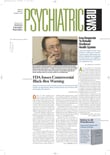Time may not heal all wounds when it comes to childhood sexual abuse. Older depressed women who experienced childhood sexual abuse prior to the age of 18 appear more likely to contemplate suicide or to have attempted suicide than same-age depressed women who do not have a history of sexual abuse, according to a report in the October American Journal of Geriatric Psychiatry.
“This study suggests that it is important for clinicians to think about and be aware of the value of asking older patients about a history of sexual abuse,” lead author Nancy Talbot, Ph.D., told Psychiatric News.
Talbot said the study is the first to look at the effects on older women of childhood sexual abuse; attention has largely been focused on its effects on women in adolescence and early adulthood, she said.
“Many times with older hospitalized adults we may minimize the impact of early life experiences,” Talbot said. “Adult life proceeds, and you accumulate more and more experience, and there is only so much the clinician can account for and think about with the patient.”
Added to this is the likelihood that older women will not bring the subject up unless they are specifically asked, she said.
Talbot is an associate professor of psychiatry at the University of Rochester School of Medicine and Dentistry.
In the study, Talbot and colleagues evaluated 127 women over the age of 50 who were admitted to a psychiatric unit with a diagnosis of major depression. Of those, 18 women reported having experienced sexual abuse in their youth, defined as “unwanted sexual contact before age 18.”
Of the 18, 15 (83 percent) had attempted suicide in their lifetime, and 12 (67 percent) had made multiple attempts. By comparison, 58 percent of women with major depression who had not experienced childhood sexual abuse reported at least one attempt in their lifetime, and 27 percent reported multiple attempts.
The abused women were also much more likely to have experienced suicidal ideation than those who had not been abused (67 percent versus 18 percent).
Suicide attempts and suicidal ideation were assessed according to the Scale of Suicidal Ideation, a 19-item, observer-rated measure of morbid and suicidal thinking administered in the week prior to interview or in the interval between a suicide attempt and the interview, whichever is shorter.
Data on sexual abuse history were derived from chart reviews of responses to the Structured Clinical Interview for DSM-IV Axis I Disorders (SCID) interview.
Those with a history of sexual abuse were also more likely to have at least one other Axis 1 diagnosis and a lifetime history of substance abuse.
“Perhaps sexual abuse amplifies the risk for a persistent desire for escape and cessation of psychic pain proceeding well into middle-age and older adulthood, marked by a history of chronic suicide ideation and multiple suicide attempts,” Talbot and colleagues wrote in the AJGP article.
The study was supported by grants from the U.S. Public Health Service.
Am J Geriatr Psychiatry 2004 12 536
